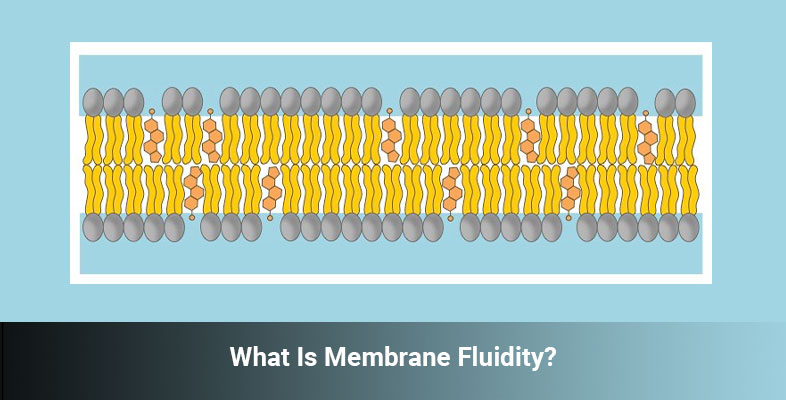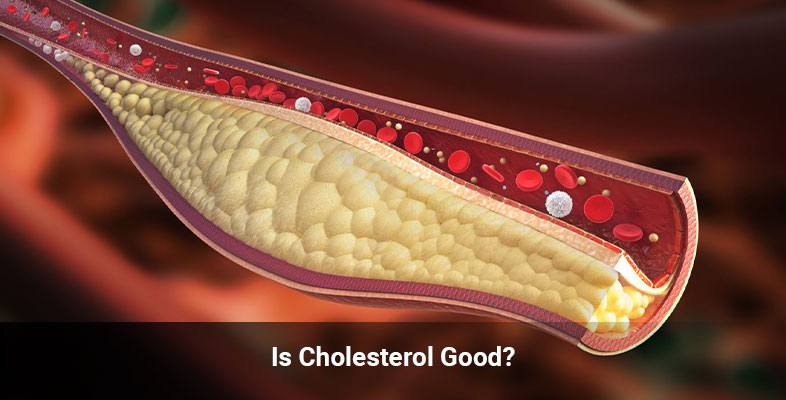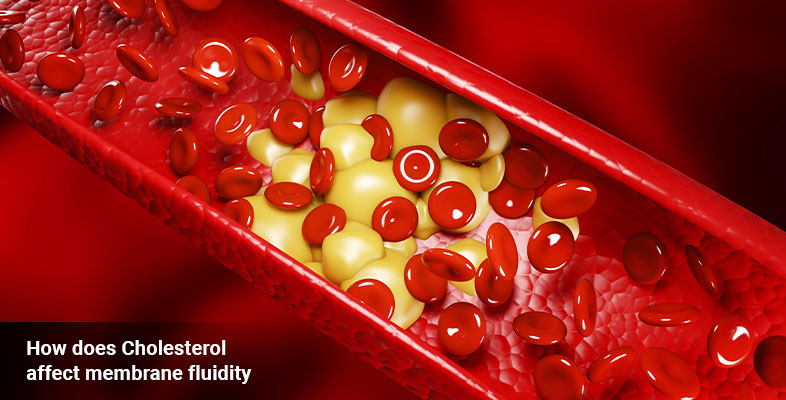How Does Cholesterol Affect Membrane Fluidity
Are you familiar with the term membrane fluidity? Well, it does not require core biology knowledge to understand the term. In simple terms, this specific parameter marks the free movement of lipid and protein constituents within the cell membranes. How does Cholesterol affect membrane fluidity in your body.
But how does cholesterol affect membrane fluidity? If you are suffering from high cholesterol and meeting the doctor regularly, this question must have crossed your mind at least once. Now, this requires some expert knowledge to understand properly.
I hope you are aware of some effects of cholesterol on the human body. The answer to this question is somewhat related to those aspects. Do you want to explore more? Read the post till the end to know how does cholesterol affect membrane fluidity.
Today. We will be shedding light on the following subtopics:
How Does Cholesterol Affect Membrane Fluidity — What Is Membrane Fluidity?

To know how does cholesterol affect membrane fluidity, you must first get a clear idea of “Membrane Fluidity.” Cell Membrane Fluidity (CMF) is the viscosity of a synthetic lipid membrane or lipid bilayer cell membrane. Whatever cellular processes are happening in your body every single second, CMF plays a great role in that. In addition, membrane-related enzymes are also impacted by CMF.
Are you thinking about the factors that affect membrane fluidity? Indeed, there are tons of influencing factors, but temperature and cholesterol percentage play a crucial role amongst all. At lower temperatures, cholesterol lowers the fluid content within membranes.
Wondering whether membrane fluidity or non-fluidity is good for humans? The answer is fluid membrane is more advantageous. It is because it provides greater flexibility to cells which in turn facilitates membrane transport. So yes, cholesterol decreases membrane fluidity but under specific temperature conditions. Read the below section to dig more about how does cholesterol affect membrane fluidity.
How Does Cholesterol Affect Membrane Fluidity In Humans?

You have been waiting for so long to know how does cholesterol affect membrane fluidity. Cholesterol definitely has larger effects on cell membrane fluidity as it makes cell membranes rigid or light. The question is when and how it changes the state of cell membranes?
We have described how does cholesterol affect membrane fluidity in the subsections below. Take a look at each point minutely to get the correct explanation.
1. Cholesterol Increases Membrane Fluidity
There is a significant role of temperature in cholesterol membrane fluidity. When the temperature is low, cholesterol prevents lipids in membranes from assimilating together. How? – by inhibiting hydrocarbon and fatty acid chains from assimilating and crystalizing together. Precisely, it hampers the crystallized lipids packaging into a more solid state. This makes the cell membranes more fluid in nature.
On that account, if you ask how does cholesterol affect membrane fluidity, The answer is Yes, it does through temperature changes!
Cells cannot function normally without exchanging molecules amongst each other. So how will they work efficiently if the fluidity is less? So cholesterol is essential for cell membranes despite its other fatal effects in terms of health.
2. Decreases Membrane Fluidity
Apart from raising the fluidity of cell membranes, cholesterol decreases membrane fluidity as well. I know the question that is knocking on your mind now is how does cholesterol affect membrane fluidity by reducing it. At higher temperatures, cholesterol prevents certain methylene groups from working in the lipids’ fatty acid tails. As a result, the liquidity augments under these circumstances.
Therefore, it is evident that cholesterol is a bi-faceted controller of cell membrane fluidity under two temperature conditions.
Is Cholesterol Good? – What Are Advantages Of Cholesterol Membrane Fluidity

By now, you have got your answer about the advantage of cholesterol membrane fluidity – right? Not only is it advantageous, but also it enables our body to function properly. If the cell membrane is less fluid, it will restrict the cell transportation capability. Hence, membrane proteins won’t be able to interact and spread in the bilayer place.
The process of cell signaling would be hampered to a great extent, subsequently messing up the dependable cell functions. Cholesterol Membrane Fluidity is consequently essential for the everyday life process. The answer to how does cholesterol affect membrane fluidity relates to the potential benefits of cholesterol in humans.
The Role of Cholesterol in Health and Disease
Cholesterol serves as a fundamental building block for cell membranes. It ensures membrane stability and fluidity, playing a pivotal role in cellular function. Moreover, cholesterol is a precursor for the synthesis of steroid hormones, including cortisol, aldosterone, and sex hormones (estrogen, progesterone, and testosterone).
It also contributes to the production of bile acids, which are crucial for digestion and the absorption of dietary fats.
In a state of health, the body maintains a delicate balance of cholesterol levels, ensuring that it is distributed to the cells that need it while regulating excess cholesterol through various mechanisms.
However, disturbances in this equilibrium can lead to a range of health issues, particularly atherosclerosis. Atherosclerosis is a condition where cholesterol accumulates in arterial walls, forming plaques that can narrow and block blood vessels, potentially leading to heart disease and stroke.
Two types of lipoproteins, low-density lipoprotein (LDL) and high-density lipoprotein (HDL), are central to understanding cholesterol’s role in health and disease. LDL cholesterol is often referred to as “bad” cholesterol because high levels can increase the risk of atherosclerosis.
In contrast, HDL cholesterol, often termed “good” cholesterol, helps remove excess cholesterol from the bloodstream and transport it to the liver for excretion.
Dietary choices and genetics significantly influence cholesterol levels. High intake of saturated and trans fats can raise LDL cholesterol levels, while a diet rich in soluble fiber, such as oats and legumes, can help lower them. Regular physical activity can also contribute to a healthy balance of LDL and HDL cholesterol.
Diseases associated with abnormal cholesterol levels include coronary artery disease, heart attacks, and strokes. Statins, a class of medications, are commonly prescribed to lower LDL cholesterol and reduce the risk of cardiovascular events.
It is crucial to recognize that while cholesterol management is essential, the complete elimination of cholesterol from the diet is not recommended. Cholesterol is still required for vital bodily functions. Instead, a focus on a balanced diet, regular exercise, and, in some cases, medication under medical supervision is the preferred approach.
Summarizing, cholesterol is a double-edged sword in the realm of health. It plays indispensable roles in cellular structure and hormone synthesis, but disturbances in its balance can result in severe health problems.
Awareness of cholesterol’s importance, regular check-ups, and adherence to a heart-healthy lifestyle are key steps in maintaining a delicate equilibrium between its benefits and potential risks.
Frequently Asked Questions
Q1. How Does Cholesterol Impact The Fluidity Of The Plasma Membrane?
Cholesterol acts as a buffer between unsaturated and saturated fatty acids. It prevents lower temperatures from checking fluidity in plasma membranes. Thus, the liquidity in the membrane increases, resulting in the transportation of proteins.
Q2. How Does Cholesterol Affect Membrane Fluidity?
Cholesterol affects membrane fluidity significantly depending upon the temperature conditions. So, temperature acts as the catalyst in the whole process. Under higher temperature conditions, the fluidity decreases rapidly, while as the temperature lowers, the same improves.
Q3. At Normal Body Temperatures, How Does Cholesterol Affect Membrane Fluidity?
At average body temperature, the cell membrane fluidity remains at the optimum level. The credit goes to cholesterol as it does not allow membranes to come closer and settle together. This system gets disrupted in too warm temperatures.
Q4. Is Cholesterol Membrane Fluidity Associated With Other Factors?
The Cholesterol membrane fluidity is dependent on phospholipids, membrane mosaic nature, cholesterol presence, and temperature. All these four aspects usher multiple effects on Membrane fluidity from time to time.
Q5. What Can I Do To Maintain A Healthy Level Of Cholesterol?
Include more whole grains, beans, fatty fish, nuts, and olive oil in the diet. These are rich sources of healthy cholesterol. In addition, eliminate full-fat dairy and red meat from your dietary regime as they are full of saturated fats.
Conclusion
We have come across several harmful properties of Cholesterol in the animal and human body, but today, you have learned one of its positive effects. Indeed, cholesterol is like that demon that kills slowly by residing in the body quietly.
But as you see now, without cholesterol also, our body will not function properly. Thus, our body needs every element in the proper amount to lead a healthy life.
I expect that you have gained a coherent idea of how does cholesterol affect membrane fluidity. If the article has enhanced your knowledge, spread it amongst people who are looking for this information. Finally, keep an eye out on our page to grab insights on similar health-related topics like this.
Read Also:
- How To Maintain a Healthy Heart
- Top 13 Best Liquid Vitamins For Women
- Nutrients That Boost The Immune System And Their Best Sources



